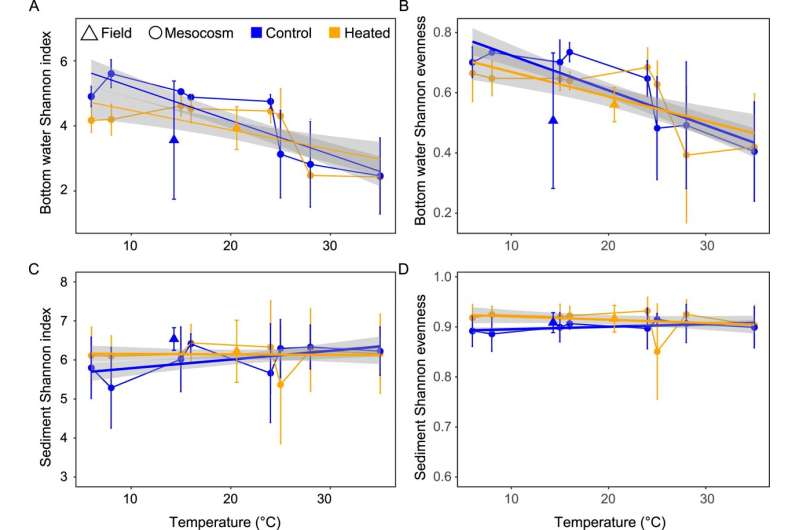This article has been reviewed according to Science X's editorial process and policies. Editors have highlighted the following attributes while ensuring the content's credibility:
fact-checked
peer-reviewed publication
trusted source
proofread
Heated bay off Sweden's coast potentially shows how ecosystems are affected by future global warming

Research at a long-term heated bay near Oskarshamn, in south east Sweden, provides a rare insight into how the Baltic Sea's coastal areas will be affected by climate change. Here, cooling water from the nearby nuclear power plant has raised the average temperature by an average of 5°C for 50 years. New research shows that this prolonged warming stresses key bacteria and makes the ecosystem more vulnerable.
The combination of a warmer and more volatile climate expected in the Baltic Sea's coastal areas in the future spells trouble for the bacterial communities living in the seabed sediments, whose functions are crucial for maintaining stability in the ecosystem.
When the average temperature increases, the bacteria lose their ability to adapt to sudden temperature changes, such as heat waves, according to a new experimental study published in The ISME Journal.
"Despite the fact that it has been 50 years since the temperature was raised in the bay, the bacterial communities we study have not fully adapted to the warmer climate. They are under constant stress, which makes them less good at handling sudden temperature differences," say Anders Forsman, Professor at the Department of Biology and Environmental Science and one of the co-authors of the study.
Simulating future weather phenomena
In the study, researchers examined how microorganisms living in the sediment of the long-term heated bay react to simulated heat waves in a laboratory environment. For nine days, samples were exposed to temperatures between 6°C and 35°C, while the activity in the bacterial communities was studied in detail. The patterns were compared with samples from a nearby unaffected bay that was also included in the experiment.
"Much of the research on the effects of climate change in aquatic environments has been conducted in a laboratory environment with individual or a few species studied in detail. The long-term warming in this bay allows us to study an entire ecosystem in a realistic future scenario," Professor and co-author Mark Dopson says.
The results show that the composition, species richness, and productivity of bacterial communities from the heated bay do not respond to temperature in the same way as in the adjacent bay, where the average temperature is more normal. One reason is that the bacteria are resource limited.
More information: Laura Seidel et al, Climate change-related warming reduces thermal sensitivity and modifies metabolic activity of coastal benthic bacterial communities, The ISME Journal (2023). DOI: 10.1038/s41396-023-01395-z
Journal information: ISME Journal
Provided by Linnaeus University


















